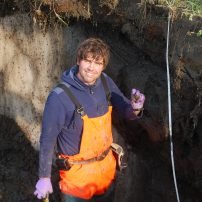
CACOON
How will changing freshwater export and terrestrial permafrost thaw influence the Arctic Ocean?
Lead Investigators
-
 View full profile
View full profileDr Paul James Mann
Co-lead investigator, Northumbria University
Paul Mann is senior lecturer in Biogeochemistry at the Department of Geography and Environmental Sciences, Northumbria University, and co-lead investigator of the CACOON project. Paul’s main focus is on aquatic and coastal carbon cycling in Arctic river systems, and how these will respond to future climate change. Within CACOON, Paul will aid in sample collection and geochemical analyses on the Kolyma River during transects out from the river to the coast.
-
 View full profile
View full profileDr Jens Strauss
Co-lead investigator, Alfred Wegener Institute (AWI)
Jens Strauss is a scientist at the Periglacial Research Unit of the Alfred Wegener Institute Helmholtz Centre for Polar and Marine Research, Potsdam, Germany. In the CACOON project he is the co-lead investigator, and responsible for identifying permafrost thaw end-members and quantifying how inputs of ancient-organic matter to aquatic systems relate to changes in terrestrial organic matter composition. Jens has been on many Arctic field expeditions in the North American and Russian Arctic, researching the vast permafrost domain of the former Beringian land mass, which was unglaciated during the last ice age.
Related Articles
-
Siberia’s permafrost erosion has been worsening for years
The Arctic is warming faster than any other region on the planet. As a result, permafrost that is thousands of years old is now being lost to erosion. Read more
16 September 2020 -
Jens Strauss talks about methane release from thawing permafrost
Dr Jens Strauss gave an interview today with Aktuelle Stunde about the climate impacts of warming in the Arctic on permafrost. Read more
08 August 2019


